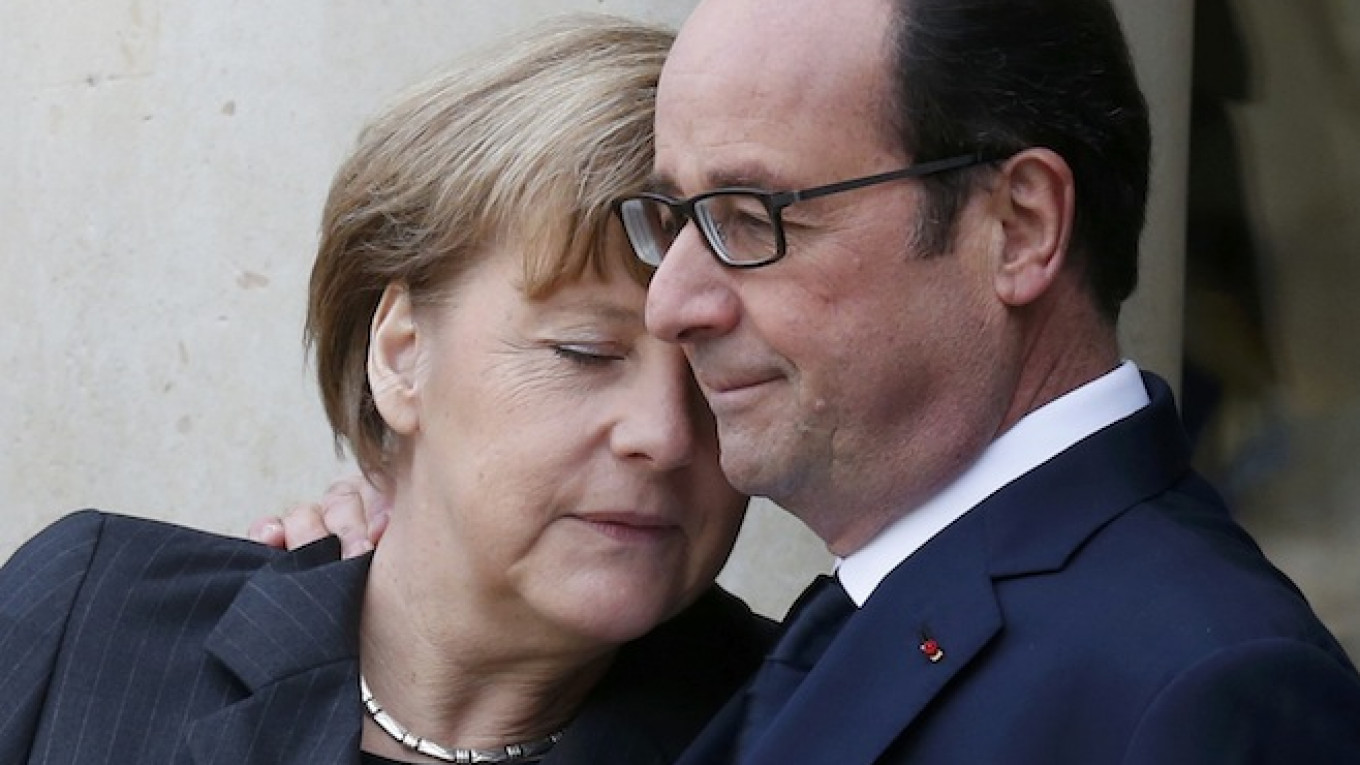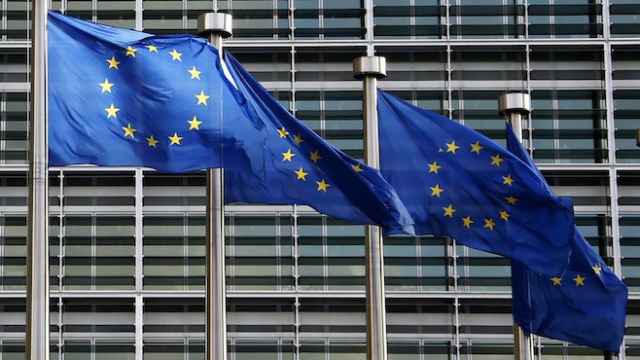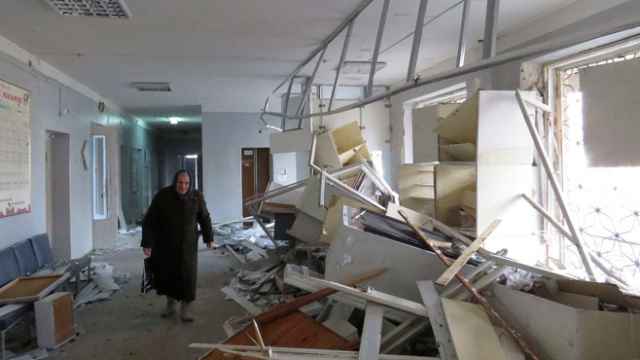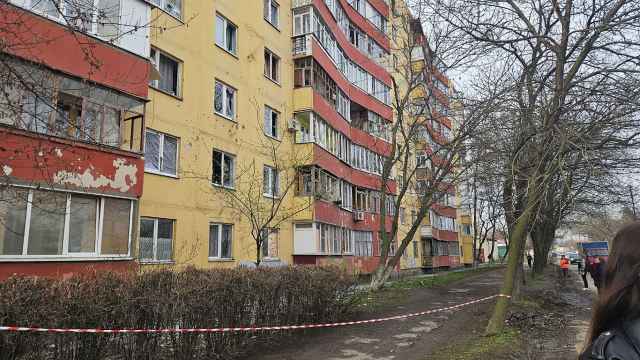In a new push for peace, the leaders of France and Germany headed Thursday to Kiev and Moscow with a proposal to end the fighting in eastern Ukraine. The surprise move appeared aimed at heading off U.S. considerations of giving Ukraine lethal weapons, something Europeans fear could spark even wider hostilities.
The flurry of high-level diplomacy comes as resurgent fighting in eastern Ukraine is threatening Europe's overall security.
In Moscow, President Vladimir Putin's aide welcomed the new European initiative and said the Kremlin was ready for a constructive discussion. NATO defense ministers in Brussels, however, were ready to boost the military alliance's forces in response to the fighting in Ukraine and Russia's increased military forcefulness.
Russia has vehemently denied backing the rebels with troops and weapons, while acknowledging that some Russians are fighting with the separatists. Western military experts scoff at the Russian denial. The top NATO commander, U.S. Air Force Gen. Philip Breedlove, said Thursday that Russia continues to supply the separatists with heavy, state-of-the-art weapons, air defenses and fighters.
Calling it a "very critical moment in our history," Ukrainian President Petro Poroshenko on Thursday warmly welcomed U.S. Secretary of State John Kerry to Kiev, the Ukrainian capital.
In a joint news conference after their talks, Kerry urged Russia to show its commitment to a peaceful, diplomatic solution to the conflict in eastern Ukraine by ceasing its military support for the separatists and bringing them to the negotiation table.
"Our choice is diplomacy," Kerry said, making no mention of providing Ukraine with lethal military aid.
Fighting between Russia-backed separatists and Ukrainian forces in eastern Ukraine surged in January, raising the death toll to over 5,300 people killed since April.
At least three people were killed in overnight shelling in the rebel stronghold of Donetsk, local officials said, and a Ukrainian military spokesman reported five servicemen killed and 29 others wounded in the east in the last 24 hours.
France and Germany were hoping this time they can come up with a peace deal that both Ukraine and Russia can agree to. In a sign of the importance of the initiative, this will be Merkel's first trip to Moscow since Ukraine's conflict broke out a year ago.
French President Francois Hollande said he and German Chancellor Angela Merkel would travel to Kiev on Thursday and then to Moscow the following day with a proposal "based on the territorial integrity of Ukraine."
"It will not be said that France and Germany together have not tried everything, undertaken everything, to preserve the peace," Hollande said.
The French leader did not mention the United States in any context, saying the two European nations have special historic, cultural and economic ties with Russia. A senior French government official said the two leaders decided Wednesday night on the trip and did not consult American officials about it. The official was not authorized to be named, according to French policy.
Kerry, however, sought to cast the new European initiative as part of unified Western efforts to support Ukraine.
He said the visit to Kiev by Merkel and Hollande "underscores that, together, the United States, France, Germany and the rest of our international partners stand united with Ukraine in calling on Russia to take the steps that I just outlined."
In Moscow, Putin adviser Yuri Ushakov said Russia was "ready for a constructive conversation" aimed at stabilizing the situation, establishing a dialogue between the Ukrainian government and the rebels and rebuilding economic ties between eastern Ukraine and Kiev. He said the Kremlin expects that Merkel and Hollande had taken Putin's own peace proposals into account, but wouldn't offer any details.
Western diplomats said Putin gave the French and Germans a nine-page peace plan, and that Hollande and Merkel are taking a repackaged version of that with them. The diplomats said the European version drops the most objectionable elements of the Russian plan and adapts it to fit what Ukraine and the Europeans want, such as some autonomy for eastern Ukraine with special protections for language, culture and local taxes.
Kerry brought $16.4 million in new humanitarian aid to Ukraine as the Obama administration weighed sending arms to help the beleaguered Kiev government fight the heavily armed, Russian-backed separatists. President Barack Obama has opposed sending weapons but sources in his administration say that position could change.
Germany and other European nations remain fiercely opposed to sending arms to Ukraine, with German Foreign Minister Frank-Walter Steinmeier and others reiterating that stance Thursday.
"By throwing more weapons on the bonfire, I don't believe, unfortunately, that we will solve the problems in Ukraine," Danish Foreign Minister Martin Lidegaard said in Copenhagen, urging more sanctions against Russia to force the rebels back into peace talks.
European Union foreign ministers will be talking Monday about increasing EU sanctions against Russia for its actions in Ukraine.
Breedlove, the top NATO commander, warned Thursday that any move to give Ukraine lethal defensive weapons must take into account a possible angry reaction from Russia.
"[That] could trigger a more strident reaction from Russia," he said.
Breedlove also emphasized it was important to make sure that Moscow and the separatists don't once again use a cease-fire to build up their forces and prepare for a new offensive to gain more territory.
Federica Mogherini, the EU's foreign policy chief, backed the French-German peace effort, saying "there is no military solution to the crisis in Ukraine."
In Brussels, NATO Secretary-General Jens Stoltenberg said the group's defense ministers are expected to boost the size of the alliance's Response Force from 13,000 to 30,000, in reaction to Russian actions in Ukraine.
Hollande, however, appeared to offer an olive branch to Putin on the Russian leader's key demand: that Ukraine stay out of NATO.
"France is not favorable to Ukraine's entry into NATO, let us be clear," Hollande said Thursday. "For the Russians who are worried ... we have to settle this problem among Europeans. We are on the same continent."
Ushakov, Putin's aide, praised Hollande's comment, saying it reflects "a pragmatic approach, which the Kremlin welcomes."
Ukraine's economy, meanwhile, has been devastated by the crisis in the east. Its currency, the hryvna, slid 46 percent Thursday against the U.S. dollar, prompting the government to raise a key interest rate by a whopping 5.5 percentage points to 19.5 percent. The move eased some pressure on the currency.
According to Poroshenko, Ukraine is spending up to $8 million a day fighting the rebels.
A Message from The Moscow Times:
Dear readers,
We are facing unprecedented challenges. Russia's Prosecutor General's Office has designated The Moscow Times as an "undesirable" organization, criminalizing our work and putting our staff at risk of prosecution. This follows our earlier unjust labeling as a "foreign agent."
These actions are direct attempts to silence independent journalism in Russia. The authorities claim our work "discredits the decisions of the Russian leadership." We see things differently: we strive to provide accurate, unbiased reporting on Russia.
We, the journalists of The Moscow Times, refuse to be silenced. But to continue our work, we need your help.
Your support, no matter how small, makes a world of difference. If you can, please support us monthly starting from just $2. It's quick to set up, and every contribution makes a significant impact.
By supporting The Moscow Times, you're defending open, independent journalism in the face of repression. Thank you for standing with us.
Remind me later.






